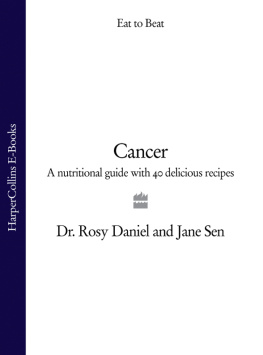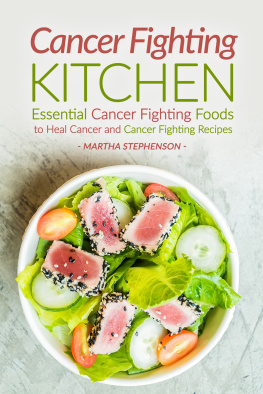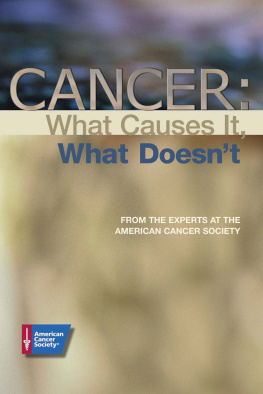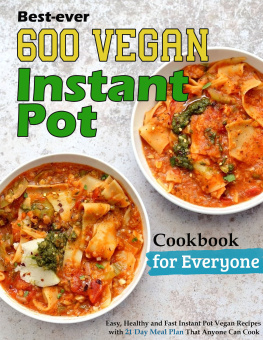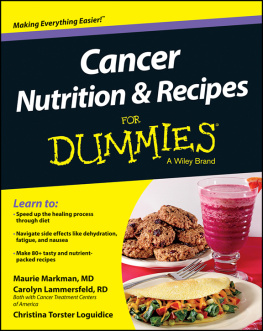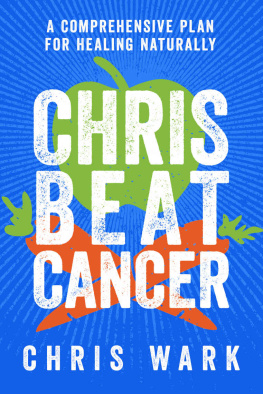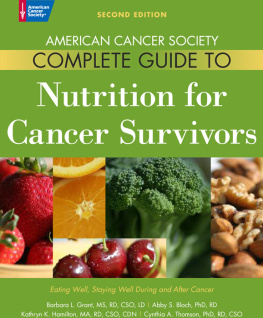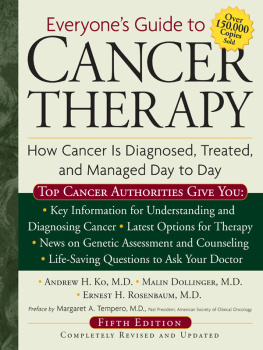
Dr Rosy Daniel and Jane Sen would like to dedicate this book to those doctors and nutritionists who were initially ridiculed for pointing out the vital relationship between cancer and diet in the 1960s and 70s. Among those who led the way were Gerson, Issels, de Vries, Moerman, Kelly, Breuss, Contreras and Forbes. All of these doctors were deemed in their time to be irresponsible for suggesting that raw vegetables, fruits and whole foods contain the key elements to protect us from cancer. Now, 40 years later, the science has caught up with these pioneers and the main theme of all cancer-prevention programmes worldwide revolves around eating increased amounts of fruits and vegetables and a healthy non-processed diet. We honour them for their brilliance and bravery in withstanding so much criticism and for the great role they have played in helping the human race start to get its health back on the right track!
We are what we eat. How many times have we all heard that simple health-education message and ignored its impact? Through aeons of evolutionary time, we as a race have survived and developed. But over the last 50 years, two sudden and major changes have taken place. We can now live much longer thanks to medical science, and this trend continues. But increasing affluence and new food technology production, storage and preparation has led to the average Western diet becoming distinctly unhealthy. This combination of increased life expectancy and a poor diet is leading to an unprecedented epidemic of potentially lethal diseases such as cancer, heart attacks and strokes. It has been estimated that 35 per cent of cancers are caused by an unhealthy diet, as are about 50 per cent of arterial disease cases. So what can we do about it? We need two things: motivation and information. This is where this very timely book by Rosy Daniel and Jane Sen comes in.
Here you will find some very practical advice. We in Britain are overfed with the wrong sorts of food produced by an industry that spends millions of pounds each year on slick advertising and marketing strategies. A healthy diet need not be expensive. This easy-to-read guide tells you how to change your diet for the better.
The first chapter tells you why you should change your diet. Reducing total calorie intake to avoid obesity is an obsession with many, but its what we eat as well as how much that is important. Dieting and bingeing are often written about, but are irrelevant to the long-term change in diet required to be healthy. The second chapter tells you how to make the necessary changes to your diet; the third chapter details what to change.
There is still much uncertainty about our food and its relationship to health. A small amount of alcohol may, for example, be beneficial. Eating lean meat may also be useful and is an excellent source of protein. But four principles, stressed time and again in this book, come over strongly in all serious studies of the subject:
1 reduce your intake of animal fat;
2 increase your daily fibre content;
3 eat plenty of fresh fruit and vegetables;
4 avoid obesity.
The fourth chapter deals with the concept of food as therapy. There is no doubt that conventional medicine has fastidiously avoided this area. Evidence of objective benefit is difficult to evaluate. But if a patient can feel better by changing his or her diet, then by definition this change has a positive effect. Increasingly, people with a wide range of illnesses want to experiment with their diet it is part of the empowering process that puts the patient in the driving seat. This book provides some very safe and sound advice for us all.
KAROL SIKORA PHD, FRCR, FRCP, VISITING PROFESSOR OF CANCER MEDICINE, DEPT OF CANCER MEDICINE, IMPERIAL COLLEGE SCHOOL OF MEDICINE, HAMMERSMITH, LONDON.
Since its opening in 1980, the Bristol Cancer Help Centre has used healthy diet as a cornerstone of its approach to helping people with cancer recover their health. Former centre medical director, Dr Rosy Daniel, now feels adamant that this is the sort of diet all of us in the West should be adopting as a matter of urgency, to prevent cancer from starting in the first place. We know that cancer, arterial disease and probably rheumatoid arthritis, asthma and diabetes all have extremely strong dietary links, and that the main culprit is our excessive consumption of animal foods and sugary and processed foods and the relative lack of fruit, vegetables and non-processed whole foods. The problem is that although most of us know this, we are often very resistant to making the change to a healthy diet.
This resistance may be put down to a number of factors. Obviously there is the pleasure we all take in consuming rich, sweet foods. There can be great comfort in the instant gratification we can get from sweets, chocolates and takeaway foods. There is also the social pressure, at school, at work and in the home, to eat normal foods so that we are not seen as fussy or difficult. In particular, theres pressure on parents to be good home-makers and to produce meals that win the immediate approval and affection of loved ones sometimes at the cost of producing foods that are more healthy. And, of course, there is the negative image surrounding healthy food. How often have we heard it described as rabbit food or hippy food, or becoming vegetarian equated with total deprivation!
This means that two things need to happen if we are to make the change successfully to a diet thats kinder to our bodies. The first is to help people change their diet in such a way that the change can be lasting, and does not result in stress or feeling as though they are missing out on nicer foods. The second is linked to this and is to change the image of healthy eating altogether!
The first of these objectives is our reason for writing this book, which I hope will serve as an extremely practical guide to the anti-cancer diet. The second of these objectives is tackled by our inspired chef, Jane Sen. Her delicious recipes are so good that healthy eating is guaranteed to become a pleasure.
We hope that, armed with this book, you will have the knowledge, guidance, support and inspiration to embark upon a new way of cooking and eating. This change will not only bring you good health but will also be a wonderful expression of your creativity and a great source of pleasure.
CHAPTER 1
Why Change the Way You Eat?
The Effects of Our Western Diet
It is now time for all of us who eat a typical Western diet to make the move to change the way we eat. Cancer and arterial disease (which causes heart attacks and strokes) are most strongly associated with our unhealthy eating patterns; people from Japan, China and Africa who take up a Western lifestyle and diet quickly start to demonstrate the same vulnerability to these lethal illnesses, having previously been protected by their more balanced diet.
Cancer and arterial disease now kill 75 per cent of British people.
OUR DIET IS BADLY OUT OF PROPORTION
An unhealthy diet causes 35 per cent of cancer in the Western world, even more than can be attributed to smoking, which causes 30 per cent of cancer. The problem is that our diet has evolved faster than our bodies ability to cope with it. As we have grown more affluent, our diet has become richer in both fats and proteins, and has become more highly flavoured with salt, sugar, spices and additives. Simultaneously, food has become far more processed and refined, its valuable roughage and nutrients being taken out. We have also tended to eat fewer and fewer vegetables, cereals, pulses and fruits. This has created the bizarre, paradoxical situation in which we are both overfed
Next page
